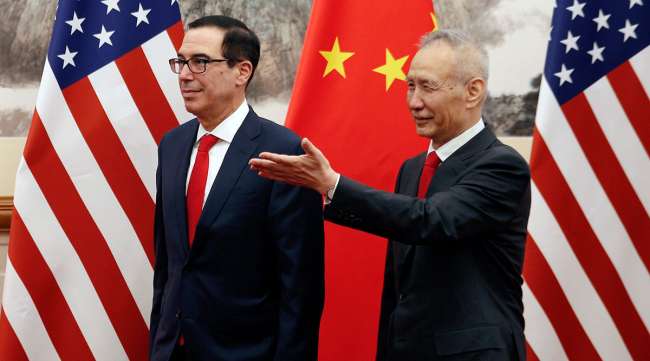Treasury Secretary Steven Mnuchin Calls Latest Round of China Trade Talks ‘Productive’

The latest round of U.S.-China talks wrapped up in Beijing on May 1, with U.S. Treasury Secretary Steven Mnuchin calling the meetings “productive” in a tweet.
Negotiations will continue in Washington next week, Mnuchin said in his tweet after the May 1 round concluded slightly later than scheduled. He took part in a photo session with U.S. Trade Representative Robert Lighthizer and China’s Vice Premier Liu He, and the delegations exchanged pleasantries.
The White House has ramped up pressure to reach a trade deal with China in the next two weeks, warning that the United States is prepared to walk away from the negotiations. President Donald Trump’s acting chief of staff, Mick Mulvaney, said April 30 the outcome will be known in the next couple of weeks “one way or the other.”
As the high-level trade talks between China and the United States got underway in Beijing, China on May 1 took another step in opening its $44 trillion financial sector to the world, announcing plans to remove limits on ownership in local banks and scrap size requirements for foreign firms that operate onshore.
.@USTradeRep Ambassador Lighthizer and I just concluded productive meetings with China’s Vice Premier Liu He. We will continue our talks in Washington, D.C. next week. pic.twitter.com/Y7vYW72a6e — Steven Mnuchin (@stevenmnuchin1) May 1, 2019
Among the changes, overseas insurance groups will be allowed to set up units in the world’s second-biggest economy, the China Banking and Insurance Regulator said. The rules are an incremental step along the path to opening China’s financial system, months after foreign firms were permitted majority stakes in local securities joint ventures.
The move came as the Trump administration is making its impatience known after four months of intense negotiations, shifting from mostly optimistic messaging about the prospect of a deal to end their trade war that’s resulted in tariffs on $360 billion of each other’s goods.
“It won’t go on forever,” Mulvaney said at the Milken Institute Global Conference in Los Angeles. “At some point in any negotiation you go, ‘We’re close to getting something done so we’re going to keep going.’ On the other hand, at some point you throw up your hands and say, ‘This is never going anywhere.’ ”
He also said there’s no “fever” on the part of the White House to finalize an accord.
After the next two rounds, U.S. officials hope to “either recommend to the president we have a deal or make a recommendation that we don’t,” Mnuchin had said in a taped interview broadcast April 29 on the Fox program “Mornings with Maria.”
A collapse of negotiations might reverse momentum in the United States and China, dousing hopes that the world economy might be able to shake off trade-war risks. The conflict has weighed on confidence and dented shipments, with nine of the 10 gauges tracked by Bloomberg to assess the health of global trade below their average midpoint.




